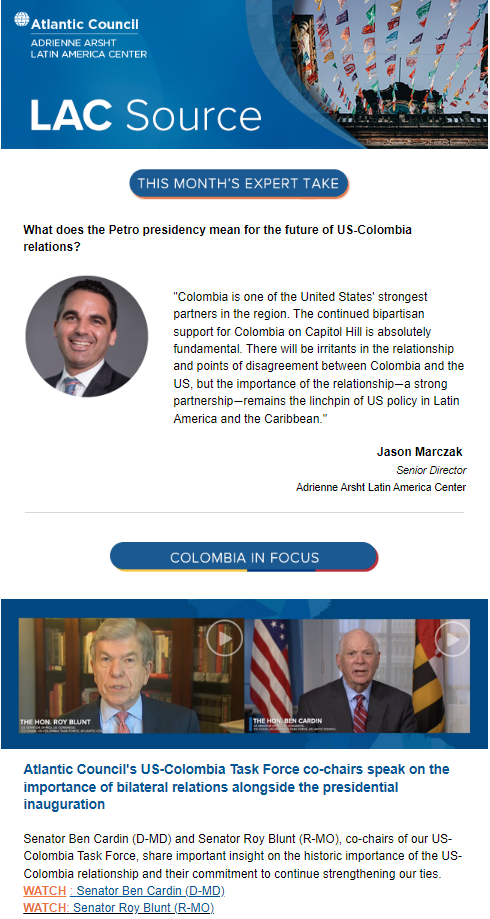The future of digital transformation and workforce development in Latin America and the Caribbean
The sixth of a six-part series following up on the Ninth Summit of the Americas commitments.
An initiative led by the Atlantic Council’s Adrienne Arsht Latin America Center in partnership with the US Department of State continues to focus on facilitating greater constructive exchange among multisectoral thought leaders and government leaders as they work to implement commitments made at the ninth Summit of the Americas. This readout was informed by a private, information-gathering roundtable and several one-on-one conversations with leading experts in the digital space.
Executive summary
At the ninth Summit of the Americas, regional leaders agreed on the adoption of a Regional Agenda for Digital Transformation that reaffirmed the need for a dynamic and resilient digital ecosystem that promotes digital inclusion for all peoples. The COVID-19 pandemic exacerbated the digital divide globally, but these gaps were shown to be deeper in developing countries, disproportionately affecting women, children, persons with disabilities, and other vulnerable and/or marginalized individuals. Through this agenda, inclusive workforce development remains a key theme as an avenue to help bridge the digital divide and skills gap across the Americas.
As part of the Atlantic Council’s consultative process, thought leaders and practitioners evaluated progress made in the implementation of the Regional Agenda for Digital Transformation agreed on at the Summit of Americas, resulting in three concrete recommendations: (1) leverage regional alliances and intraregional cooperation mechanisms to accelerate implementation of the agenda; (2) strengthen public-private partnerships and multisectoral coordination to ensure adequate financing for tailored capacity-building programs, the expansion of digital infrastructure, and internet access; and (3) prioritize the involvement of local youth groups and civil society organizations, given their on-the-ground knowledge and role as critical indicators of implementation.
Recommendations for advancing digitalization and workforce development in the Americas:
- Leverage regional alliances and intraregional cooperation mechanisms to accelerate implementation of the agenda.
- Establish formal partnerships between governments and local and international universities to broaden affordable student access to exchange programs, internships, and capacity-building sessions in emerging fields such as artificial intelligence and cybersecurity. Programs should be tailored to country-specific economic interests and sectors such as agriculture, manufacturing, and tourism. Tailoring these programs can also help enhance students’ access to the labor market upon graduation.
- Ensure existing and new digital capacity-building programs leverage diaspora professionals. Implement virtual workshops, webinars, and collaborative projects that transfer knowledge and skills from technologically advanced regions to local communities. Leveraging these connections will help ensure programs are contextually relevant and effective.
- Build on existing intraregional cooperation mechanisms and alliances to incorporate commitments of the Regional Agenda for Digital Transformation. Incorporating summit commitments to mechanisms such as the Alliance for Development in Democracy, the Americas Partnership for Economic Prosperity, the Caribbean Community and Common Market, and other subregional partnerships can result in greater sustainability of commitments as these alliances tend to transcend finite political agendas.
- Propose regional policies to standardize the recognition of digital nomads and remote workers, including visa programs, tax incentives, and employment regulations. This harmonization will facilitate job creation for young professionals and enhance regional connectivity.
- Prioritize workforce development for traditionally marginalized groups by strengthening public-private partnerships and multisectoral collaboration.
- Establish periodic and open dialogues between the public and private sectors to facilitate the implementation of targeted digital transformation for key sectors of a country’s economy that can enhance and modernize productivity. For instance, provide farmers with digital tools for precision agriculture, train health care workers in telemedicine technologies, and support tourism operators in developing online marketing strategies.
- Foster direct lines of communication with multilateral organizations such as the Inter-American Development Bank and the World Bank. Engaging in periodic dialogues with these actors will minimize duplication of efforts and maximize the impact of existing strategies and lines of work devoted to creating digital societies that are more resilient and inclusive. Existing and new programs should be paired with employment opportunities and competitive salaries for marginalized groups based on the acquired skills, thereby creating strong incentives to pursue education in digital skills.
- Collaborate with telecommunications companies to offer subsidized internet packages for low-income households and small businesses and simplify regulatory frameworks to attract investment in rural and underserved areas, expanding internet coverage and accessibility.
- Enhance coordination with private sector and multilateral partners to create a joint road map for sustained financing of digital infrastructure and workforce development to improve investment conditions in marginalized and traditionally excluded regions and cities.
- Increase engagement with local youth groups and civil society organizations to help ensure digital transformation agendas are viable and in line with local contexts.
- Facilitate periodic dialogues with civil society organizations, the private sector , and government officials and ensure that consultative meetings are taking place at remote locations to ensure participation from disadvantaged populations in the digital space. Include women, children, and persons with disabilities to ensure capacity programs are generating desired impact and being realigned to address challenges faced by key, targeted communities.
- Work with local actors such as youth groups and civil society organizations to conduct widespread awareness campaigns to help communities visualize the benefits of digital skills and technology use. Utilize success stories and case studies to show how individuals and businesses can thrive in a digital economy, fostering a culture of innovation and adaptation.
- Invest in local innovation ecosystems by providing grants and incentives for start-ups and small businesses working on digital solutions. Create business incubators and accelerators to support the growth of digital enterprises, particularly those addressing local challenges.
- Offer partnership opportunities with governments to provide seed capital, contests, digital boot camps, and mentorship sessions specifically designed for girls and women in school or college to help bridge the gender digital divide.
Related content
Related experts

Subscribe to LAC Source Newsletter
Get monthly updates on Latin America and the Caribbean (LAC) to receive the latest developments of the region, upcoming public events and recaps, new reports, and more.

The Adrienne Arsht Latin America Center broadens understanding of regional transformations and delivers constructive, results-oriented solutions to inform how the public and private sectors can advance hemispheric prosperity.





